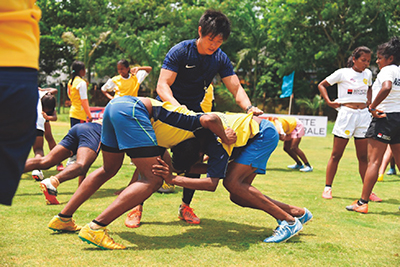(5) Culture and Sports
Cultural heritage that symbolizes a country is a source of pride for people, and, as tourism resources, can be effectively utilized to improve the livelihoods of the residents in the surrounding areas. On the other hand, a number of cultural heritage sites are in danger due to the lack of funds, equipment, and technology among others, and assistance to protect such cultural heritages is required. In addition, the preservation and promotion of culture, such as invaluable cultural heritages that are shared by all humankind, are an issue that should be addressed not only by the countries with cultural heritage in danger, but also by the entire international community.
Moreover, sports can not only enhance the quality of people’s lives, as they cultivate a sense of respect for others, a spirit of mutual understanding, and awareness of norms, but also help maintain and improve health. The influence and positive power of sports play the role of “catalyzer” for the development and growth of developing countries.
● Japan’s Efforts

A scene from the international friendly practice match between youth rugby teams from India and Sri Lanka, and JOCVs dispatched to each country’s rugby association instructing each team. The match was held to promote friendship and goodwill among players of both countries, improve their skill of rugby, popularize it in these countries, and realize the healthy development of youth through international cooperation. (Photo: JICA)
Japan has provided assistance for the promotion of culture and higher education as well as the preservation of cultural heritage and promotion of sports in developing countries through the Cultural Grant Assistance* since 1975. Specifically, Japan has constructed or rehabilitated facilities for sports and culture or higher education and research institutions and provided equipment for those facilities in developing countries. Japan has also constructed facilities and provided equipment for the restoration, preservation, and utilization of cultural heritage and property. Such facilities built in developing countries also serve as hubs for spreading information about Japan and holding cultural exchanges with Japan, as well as deepening understanding of Japan and fostering a sense of affinity toward Japan.
In 2020, Japan approved 19 projects to provide support in the fields of education, including Japanese language education, preservation of cultural heritage, and sports under the Cultural Grant Assistance. Furthermore, Japan provided sports assistance using ODA and “Projects for Sports Diplomacy Enhancement” to advance “Sport for Tomorrow,” Note 38 a program launched for the purpose of international contribution through sports. Under the program, Japan aimed to spread the value of sports and the Olympic and Paralympic movement as the host country of the Olympic and Paralympic Games Tokyo 2020, which had been postponed until 2021 Note 39. In addition, Japan has dispatched 142 JOCVs in the field of sports.
Moreover, Japan provides support for the restoration and preservation of cultural heritage, including equipment provision and preliminary studies and surveys, through the “Japanese Funds-in-Trust” established in the United Nations Educational, Scientific and Cultural Organization (UNESCO). Japan contributed approximately ¥1 billion in FY2020 and has implemented multiple projects in the field of cultural heritage through the fund. Placing a particular emphasis on human resources development in developing countries, so as to enable people to protect the cultural heritage of their own country by themselves in the future, Japan also endeavors to dispatch international experts, mainly Japanese experts, as well as hold workshops in order to transfer the techniques and expertise to developing countries. In addition to tangible cultural heritage, Japan also supports the safeguarding of intangible cultural heritage such as traditional dances, music, handcraft techniques, and oral lore (oral traditions) by implementing successor training, records conservation, the creation of safeguard mechanisms, and other activities through the Japanese Funds-in-Trust.
Furthermore, Japan is also conducting training programs with the aim of improving capabilities for the protection of cultural heritage by inviting young experts involved in cultural heritage protection from the Asia-Pacific region to Japan as part of the “Project for the Promotion of Cooperation for the Protection of World Heritage and Other Cultural Properties in the Asia-Pacific Region.” In addition to conducting biennial training on maintenance and repair methods for wooden buildings and survey records of archeological remains, training on the effective utilization and management of cultural heritage for experts in Bhutan and other activities were conducted virtually in 2020.
- *Cultural Grant Assistance
- Cultural Grant Assistance is a grant aid to procure equipment and supplies and to construct and rehabilitate facilities for the promotion of culture and higher education in developing countries. It is intended to encourage cultural and educational advancements in developing countries as well as cultural exchanges between Japan and these countries with an aim of promoting friendly relationships and mutual understanding. It includes Cultural Grant Assistance, which provides assistance to governmental organizations of developing countries, and Grant Assistance for Cultural Grassroots Projects, which provides assistance to NGOs and local public entities for small-scale projects.
- Note 38: Sport for Tomorrow Consortium (https://www.sport4tomorrow.jpnsport.go.jp)
- Note 39: MOFA’s efforts regarding the Tokyo 2020 Olympic and Paralympic Games (https://www.mofa.go.jp/p_pd/ep/page23e_000467.html)
